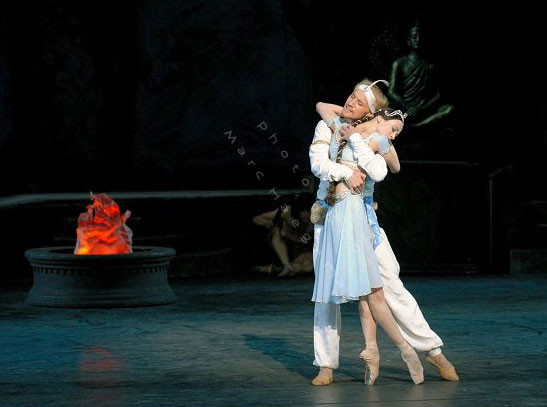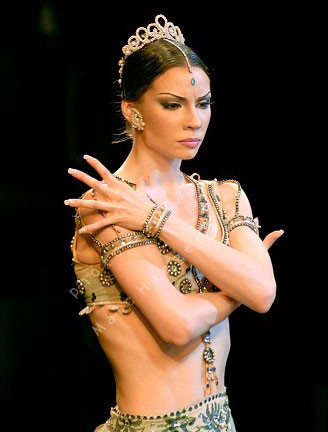|
11 July 2019 (Thu), 19:00 Russian National Ballet Theatre - Classical Ballet "La Bayadere"

Running time: 2 hours 30 minutes (till 21:20)
The performance has 1 intermission
Schedule for "La Bayadere" 2022
Composer: Ludwig Minkus
Choreography: Marius Petipa
Orchestra: Symphony orchestra of the Summer Ballet Seasons
Classical Ballet in 3 act
A wonderful ballet originally staged in four acts and seven tableaux by French choreographer Marius Petipa to the music of Ludwig Minkus.
The famous French choreographer Marius Petipa at the end of the 19th century created the ballet La Bayadere. It tells the tragic love story of a dancer and a warrior, based on an ancient Indian legend. In those days, the East was in fashion: artists, poets and composers often turned to exotic subjects in search of inspiration.
The music for the ballet La Bayadere was written by the Czech composer Ludwig Minkus, who worked a lot in Russia.
At the end of the 19 th century a famous French choreographer Marius Petipa ( He was called Marius Ivanovich in Saint Petersburg) created the ballet "La Bayadère". It tells a tragic love story of a dancer and a warrior, based on an ancient Indian legend.
In those days, Oriental topic was popular: artists, poets and composers were looking for the inspiration in exotic subjects. The music to the ballet was composed by Ludwig Minkus, a Czech composer who worked a lot in Russia. (For the convenience, he was given the Russian patronymic - Fyodorovich and was called Ludwig Fyodorovich).
In 1877, the result of Marius Ivanovich and Ludwig Fyodorovich's work was presented to sophisticated St. Petersburg's audience. The audience was delighted by the beautiful music and complicated choreography, luxurious costumes and amazing scenery, fascinating plot, vivid characters and a bit of magic. After the first night, the ballet was staged a lot in Russia and abroad and became one of the
most popular performances.
Synopsis
Act I
Scene 1: The Park of a Castle
Prince Siegfried and his friends are celebrating his coming of age at a private party. The guests drink to his health and the jester entertains them with his antics. The Prince is warned that his mother, the Princess Regent, is approaching.
She is displeased with her son’s behaviour and she presents him with a crossbow. After the Princess has gone, the partying begins anew.
Twilight falls. The guests depart and the Prince is left alone in the park. High above, Siegfried catches sight of a flock of white swans and the vision stirs the hunter’s urge in him.
Seizing his bow, the Prince makes his way off into the heart of the forest.
Scene 2: A Lake in the Forest in the Middle of the Night
White swans are swimming near the shore; they are beautiful young maidens who have been transformed by the evil magician von Rothbart. Only at night can they assume human form and the only power on earth which can break this evil spell is devoted love.
Siegfried appears. He sees one of the white birds come to shore and draws his bow to shoot it. The bird suddenly turns into a beautiful woman – it is Odette, Queen of the swan-maidens. Odette’s beauty enthrals the Prince and he tries to capture her. She, however, is afraid of the evil magician and, as she avoids Siegfried, she disappears in the midst of the swan-maidens. Siegfried runs after Odette and vows eternal love and fidelity to her.
Odette’s heart responds in the same way to Siegfried’s passionate love.
Dawn breaks. Odette bids Siegfried a tender farewell and the white swans glide slowly away across the lake.
Act II
Scene 3: A Ball at the Castle
Siegfried must choose a bride from among the well-bred maidens who have been invited, but he remains indifferent to them all because he has given his heart to Odette. Only at his mother’s insistence does he dance with any of the prospective brides.
He must, however, choose one of them, and as a token of his love, he must give his chosen bride a bouquet. As he faces this dilemma, however, a fanfare of trumpets heralds the arrival of new guests – the magician von Rothbart and Odile, his daughter. The Prince is struck by her resemblance to Odette.
Von Rothbart wants the Prince to fall in love with Odile so that he will break his vow of eternal love and fidelity; Odette will then remain in the sorcerer’s power forever. It is for this reason that he has given his own daughter Odette’s form and features. Odile seduces Siegfried, who is fascinated by her charm. He announces to his mother that the beautiful Odile is his choice. The wicked magician is jubilant.
Suddenly Siegfried sees a vision of the true swan-maiden outside the castle window and realises that he has been deceived into breaking his vow. In despair, he rushes to the lake to find his beloved Odette.
Act III
Scene 4: The Lakeside, at Night
The swan-maidens stand dejected and sad. Odette has told them what has happened.
Siegfried rushes in. He begs Odette to forgive him and he professes his undying love for her, but the enraged sorcerer summons the black swans and commands them to separate Odette and Siegfried. Siegfried grapples with the sorcerer. Fearless in the encounter, he breaks von Rothbart’s wing. The sorcerer collapses, his power gone, and he dies. Love has broken the evil spell. The sun rises and shines radiantly on the Prince and Odette, and on the maidens whom Siegfried has rescued.
Synopsis
Act I
Young warriors led by Solor are hunting a tiger. Before entering the forest Solor asks a fakir, named Magedavia, to tell Nikia, a bayadere, that he will wait for her near the temple.
The High Brahmin and priests are solemnly leaving the temple. The feast of worshipping fire begins. Fakirs and votaries of the temple, bayaderes, are performing sacred dances. Beautiful Nikia is among them. She adorns the festival.
Having forgotten about his ordination and vow of celibacy, the High Brahmin tells Nikia that he loves her and promises to place at her feet all the riches of India. Nikia rejects his wooing. She will never love him.
Nikia and other bayaderes give the fakirs water from the sacred pool. Imperceptibly Magedavia tells Nikia that Solor will come to see her. The bayadere is happy.
It is getting dark. Nikia comes to meet her beloved. Their secret rendezvous is guarded by the fakir. But the High Brahmin manages to overhear the conversation of the sweethearts.
Solor proposes that they elope. The bayadere agrees, but first she wants him to vow fidelity to her at the sacred fire. Solor takes the oath. The High Brahmin is infuriated. He appeals to the gods and demands punishment. His revenge will be terrible.
Next morning the rajah Dugmanta, head of the principality, tells his daughter Gamzatti that she will see her fiance that day.
The rajah sends for the fiance. It is the brave warrior Solor. The rajah shows Solor his beautiful daughter and proclaims them bride and groom. The warrior is struck by Gamzatti’s beauty. But he remembers the bayadere, his vow to her, and is thrown into confusion.
It is time to hold the ceremony of consecrating Gamzatti’s betrothal. Nikia is invited to the palace for the ceremony.
The High Brahmin arrives. He wants to tell the rajah a secret. Dugmanta sends everybody away. Gamzatti feels that the High Brahmin’s arrival is somehow connected with her forthcoming marriage and eavesdrops on the Brahmin’s conversation with her father.
The High Brahmin tells the rajah about Solor’s love for Nikia. Dugmanta is infuriated but doesn’t change his mind to give his daughter in marriage to Solor. The bayadere, who made Solor take the oath, must die.The High Brahmin who had wanted to get rid of his rival, didn’t expect such a turn of events.
He threatens the rajah with punishment of the Gods for the bayadere’s death. But the rajah is unrelenting.
Gamzatti orders her slave to bring Nikia. She sees that the bayadere is very beautiful and can be a dangerous rival. The rajah’s daughter tells the bayadere about her forthcoming marriage and invites her to dance at the feast. She deliberately shows her the portrait of her fiance Solor. Nikia protests: Solor loves only her and he made a vow of eternal fidelity. The rajah’s daughter demands that Nikia should give up Solor. But the bayadere would rather die than part with Solor. Gamzatti offers her jewels. Nikia throws them away with scorn. Nothing will make her part with her beloved. She raises her dagger in a rage. The slave stops her. But Gamzatti will never give her fiance back.
Act II
A sumptuous feast is being held on the occasion of Solor and Gamzatti’s engagement. The bayadere Nikia is supposed to entertain the guests with dances. She can’t hide her grief. Her eyes are fixed on her beloved Solor.
The fakir presents Nikia with a basket of flowers on behalf of Solor. The bayadere’s dance is filled with happiness. But suddenly a snake crawls out of the flowers and bites her fatally.
Nikia realizes that the rajah’s daughter is to blame for her death. The High Brahmin promises to save her life if she will love him. But the bayadere is faithful to her love for Solor. Nikia dies. Solor leaves the feast in despair.
Act III
Solor is inconsolable. He is gnawed by remorse. He enjoins the fakir to distract him from his grievous thoughts. Fascinated by the sacred dance, Solor sinks into the world of dreams.
Shadows appear to him out of the darkness. They are descending from mountains in a long file. Solor sees fair Nikia among them…
Solor comes out of his dazed state and hurries to the temple. He prays to the gods to forgive him. But it’s too late. The infuriated gods punish Solor for his betrayal of love. Lightning and thunder destroy the temple. There is no more reality for Solor. He follows the shadow of fair Nikia…






Schedule for "La Bayadere" 2022
     
| 


